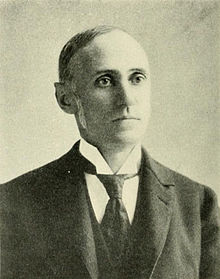Benjamin Franklin Howell
Benjamin Franklin Howell (born January 27, 1844 in Cedarville , Cumberland County , New Jersey , † February 1, 1933 in New Brunswick , New Jersey) was an American politician . Between 1895 and 1911 he represented the state of New Jersey in the US House of Representatives .
Career
Benjamin Howell attended public schools in his home country and then the Fort Edward Institute in New York . During the Civil War , he served in a New Jersey volunteer unit in the Union Army from 1862 . After the war he settled in South Amboy , where he worked in commerce. Between 1882 and 1892 he was guardianship judge ( surrogate ) in Middlesex County . Howell was also active in the banking industry, where it made it to the President of the People's National Bank of New Brunswick . He was Vice President of the New Brunswick Savings Institution . He also began a political career as a member of the Republican Party .
In the congressional elections of 1894 Howell was elected to the US House of Representatives in Washington, DC in the third constituency of New Jersey , where he succeeded Jacob Augustus Geissenhainer on March 4, 1895 , whom he had defeated in the election. After seven re-elections, he was able to complete eight legislative terms in Congress by March 3, 1911 . During this time the Spanish-American War of 1898 and its aftermath fell. Benjamin Howell was chairman of the Immigration and Naturalization Committee from 1903 to 1911. In June 1896 he took part as a delegate to the Republican National Convention in St. Louis , at which William McKinley was nominated as a candidate for president. From 1907 to 1910 he was a member of the Federal Immigration Commission. In 1910 he was defeated by the Democrat Thomas J. Scully .
After his time in the US House of Representatives, Benjamin Howell retired from politics. He died in New Brunswick on February 1, 1933.
Web links
- Benjamin Franklin Howell in the Biographical Directory of the United States Congress (English)
- Benjamin Franklin Howell in the database of Find a Grave (English)
| personal data | |
|---|---|
| SURNAME | Howell, Benjamin Franklin |
| BRIEF DESCRIPTION | American politician |
| DATE OF BIRTH | January 27, 1844 |
| PLACE OF BIRTH | Cedarville , New Jersey |
| DATE OF DEATH | February 1, 1933 |
| Place of death | New Brunswick , New Jersey |

